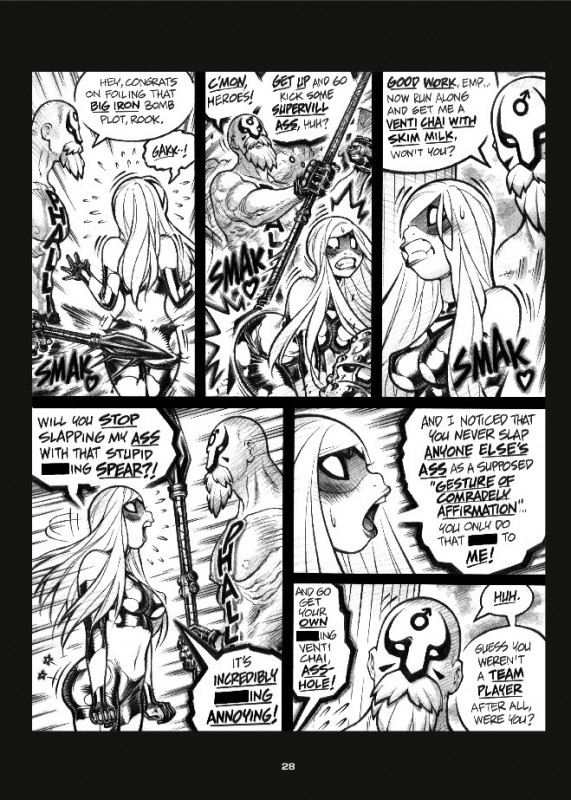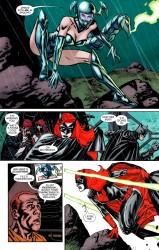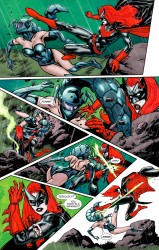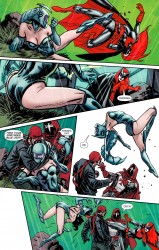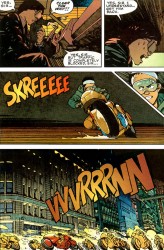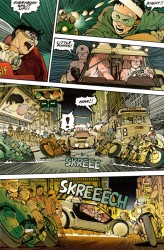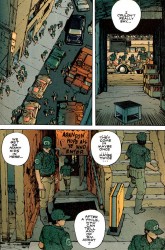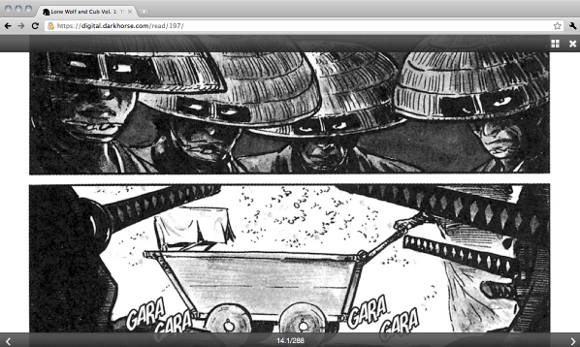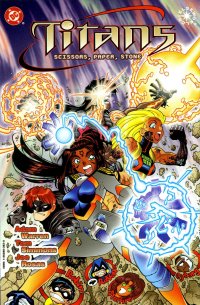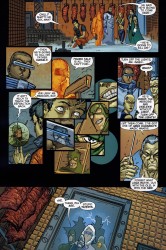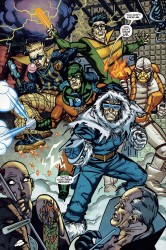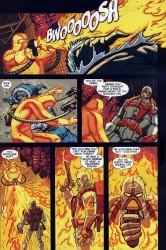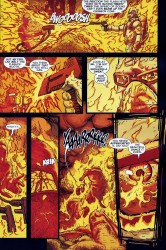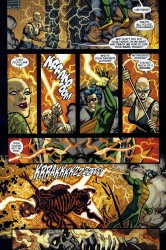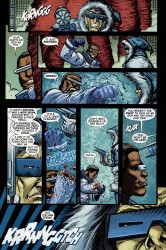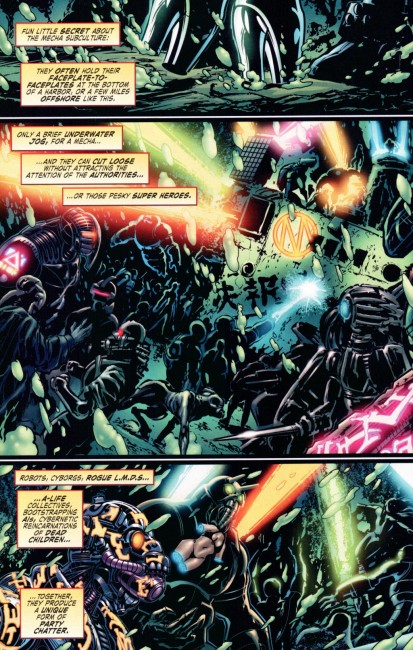
You ever hear someone talk about how certain writers are “idea guys?” Essentially, what that means is that some people consistently have good ideas but somehow manage to be poor writers. Maybe they don’t stick the landing, maybe they layer on too many ideas and don’t bother with execution, I don’t know. I don’t know that I buy the premise, to be perfectly honest. Most people I would think of as idea guys, people who come up with stuff that’s original and interesting, also tend to be good at the rest of the writing.
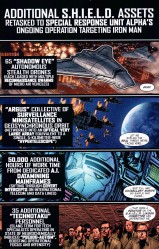
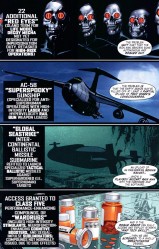
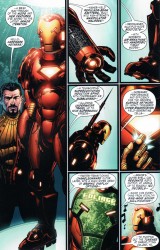
Take Adam Warren for example. He’s got a distinctive take on dialogue, which ranges from clipped to wordy to self-aware to self-conscious. The dialogue is clearly his work, but it isn’t completely obvious in the way that say, Warren Ellis or Brian Bendis’s tics are obvious. He’s good at characterization, too, knowing how to toss in the right mix of humor and pathos and outright absurdity to keep you interested. His pacing tends to be off the chain, with stories that begin at high speed and then just keep ratcheting up higher and higher. And hey, he’s a cartoonist, and his art is dope. I mean, that’s the total package, right?
What I might like most about Warren are his ideas, though. Cape comics tend to dabble in science fiction by having characters declare that they are futurists shortly before engaging in the same boring old ideas and technology that they had years ago. Tony Stark fights guys in bulky robot suits or corrupt businessmen. Reed Richards innovates endlessly with no visible effect on anything ever. Lex Luthor is a supergenius who apparently keeps all his inventions to himself. We’re told how smart people are, but rarely ever get to see it in action.
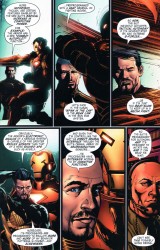
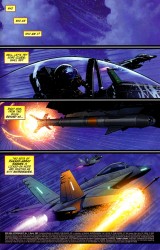
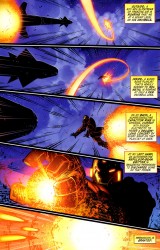
Remember when Chuck Dixon brought a distinctly Guns’n’Ammo flavor to Punisher and Batman? Suddenly everything was Kevlar nomex weave this and terminal velocity that and, coincidentally, a whole lot more interesting. Dixon brought it just close enough to how things might actually work in real life to give the books a boost.
If Chuck Dixon brought Guns’n’Ammo to Punisher, Adam Warren is the guy who brings Scientific American and a fat folder of esoteric technology-related Wikipedia bookmarks to the superset. Iron Man: Hypervelocity is honestly probably the only Iron Man comic you need to read if you want an Iron Man story that fully engages with the character and the world he theoretically lives in.
is honestly probably the only Iron Man comic you need to read if you want an Iron Man story that fully engages with the character and the world he theoretically lives in.
Iron Man is theoretically a high tech hero, but his high tech is usually limited to what, a new kind of laser beam and an uglier suit? Warren and Brian Denham created an Iron Man story that actually used real-life technology to enhance Stark’s fake comic book tech. Repulsors are all well and good, but at the end of the day, they’re just a laser beam. Rockets in your shoes aren’t high tech, and neither is on-board radar.
Normal Iron Man putters around on his jet boots and sometimes uses his hands to adjust his trajectory. He’s essentially your generic airplane, or maybe an arrow. In Warren’s hands, though, Iron Man gained a new tool: high-speed thrust vectoring. It’s not a new technique by any means, but it is a fantastic visual and interesting to see. Boiled down, thrust vectoring is the act of changing the direction of your propulsion, Iron Man’s rocket boots, to instantly adjust his trajectory. When combined with propulsion from Iron Man’s palms, you suddenly have an Iron Man who doesn’t maneuver like a man at all. He’s infinitely more maneuverable and isn’t stuck on just a horizontal or vertical plane. The sky is his playground. Rapid fire direction adjustments means that dogfights suddenly aren’t just about your on-board computer screaming about some guy on your six.
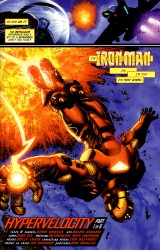
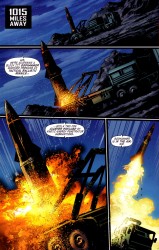
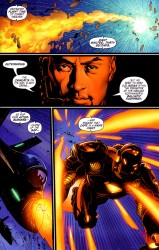
Or say Iron Man goes underwater. In the past, he’d have a special underwater suit. You know the type. It’d look a lot like a diving bell, or like something Jacques Costeau would use. Not in Hypervelocity, no. Function doesn’t have to battle form. Warren introduced another simple idea, supercavitation, and suddenly you’ve got an Iron Man who can travel underwater at disgusting speeds.
Look at your average comic book military figure. He’s just a dude, usually cast in the Sgt Rock mold, who has to keep track of several different moving parts in an operation. At the heart of it all… he’s just a man. Warren pulled another idea from real life, this time smart drugs, and threw a little sauce on it. Meet wardrugs. Take them and you get enhanced processing power, focus, artificial emotional stability, and a host of other benefits. Call it Sgt Rock Plus.
Marvel books in particular have indulged in established characters having killer robots specifically designed to kill them. Iron Man, Hulk, Spider-Man, and I’m pretty sure even Captain America have run into them, whether they were LMDs or Spider Slayers. Why not apply that to something other than killer robots? Hunter/killer drones piloted remotely by flight sim nerds back at the base. Give them a high bandwidth link to the field and suddenly your Xbox 360 is a training device. Ever done an escort mission in a Star Wars game? Then you’re qualified to work for SHIELD.
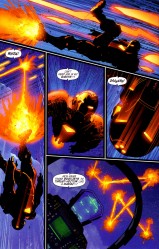
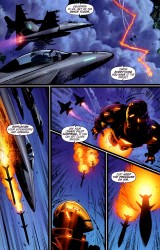
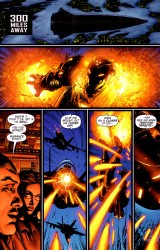
Or hey! You know what Iron Man needed? You want to know an easy way to instantly build character in a comic? Give him an on-board music player and fill it with character-specific tunes. Oh wait, Warren already did that. Too late, suckers. Just 9,000 songs on the playlist, though, so I’m sure you can do 9,001 and call it a night.
Artificially intelligent personal subroutines that run subconscious threat assessment, resource allocation, and repair functions. Backups of your personality for emergency situations. A mecha underground, where all the forgotten and ruined robots go to play and create their own subculture. LMDs created for custom wetworks. Fire and forget assassins, ready for any situation and self-sustaining. Capekilling units that employ weapons specifically designed to puncture superhardened targets. Creating a concrete-hard wall of sound underwater that becomes a crippling shockwave–literally, music as a weapon. Technotaku specifically tasked with predicting the future based on known data. The speed of the human brain being a “cognitive clockspeed barrier” for artificial intelligences–robots can only think as fast as humans can without some kind of new technology. Microdrones meant to paint a target for further engagement by a variety of compatible hardware. A SHIELD helicarrier that doubles as a deathtrap for invading forces. Autonomous repulsor target acquisition and elimination. Mollywire. Fuel-air suicide bombs.
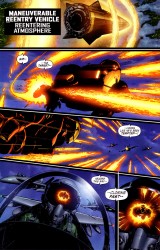
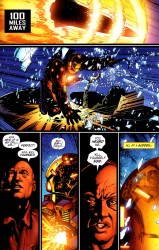
This book was six issues. The final issue was time-synched to Iggy and the Stooges’s “Search and Destroy” because the issue took place over around three and a half minutes. It’s filled with fresh ideas. And yet, for some reason, the most Tony Stark has done in the past few years is stand around naked in some fake virtual reality room, talk about how his armor is in his bones now, and fly around like he always has.
Innovation isn’t Tony Stark fighting a a giant robot. Innovation is Tony Stark taking real life and making it doper. Innovation is Tony Stark pirating software from evil organizations because they thought of something he didn’t, but he thought of a way to make it better. Innovation is a Tony Stark who doesn’t just run through the same old stories again and again, with hardware that’s barely any different from 1963 or 1999.
I mean, the military has a pain ray. It shoots a microwave beam that cooks people from nearly a kilometer out. You can control it with a joystick and a screen if you need to, which turns a war zone into Duck Hunt. That’s way more hype than simple lasers and a shoulder-mounted gatling gun.
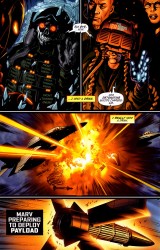
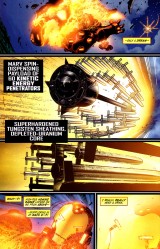
Adam Warren is an idea guy in the best possible sense of the phrase. If you want to kick something into high gear, really peel back what makes it work and throw a whole bunch more stuff into the mix without breaking your character, he’s the man to come see. Hypervelocity is what Iron Man should always be like. Something fresh, something moving at Mach 8, and something that takes something from real life and makes an ill comic book concept out of it. Warren just pours ideas onto the page at a rate no other writer can match. He drops them out there into the world where they’re just aching to be explored.
Anything he writes, man. I’m there, sight unseen. His main series right now is Empowered , his “sexy superhero comedy” that manages to have its cake and eat it, too, with regards to commentary on superheroes. He had a killer run on Gen 13
, his “sexy superhero comedy” that manages to have its cake and eat it, too, with regards to commentary on superheroes. He had a killer run on Gen 13 , the kind of run that Teen Titans has been begging for lately.
, the kind of run that Teen Titans has been begging for lately.
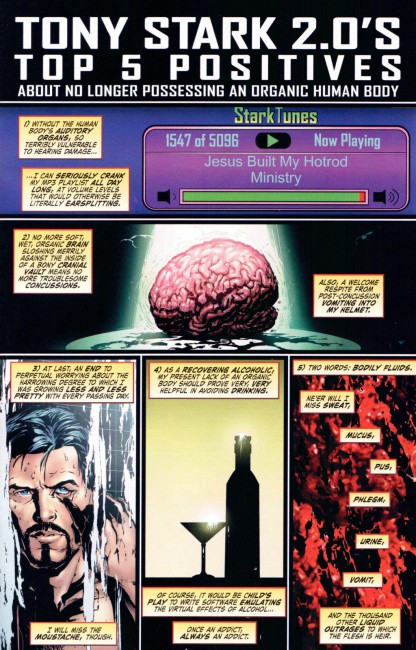


(Empowered Volume 7
is due out soon, get some):
